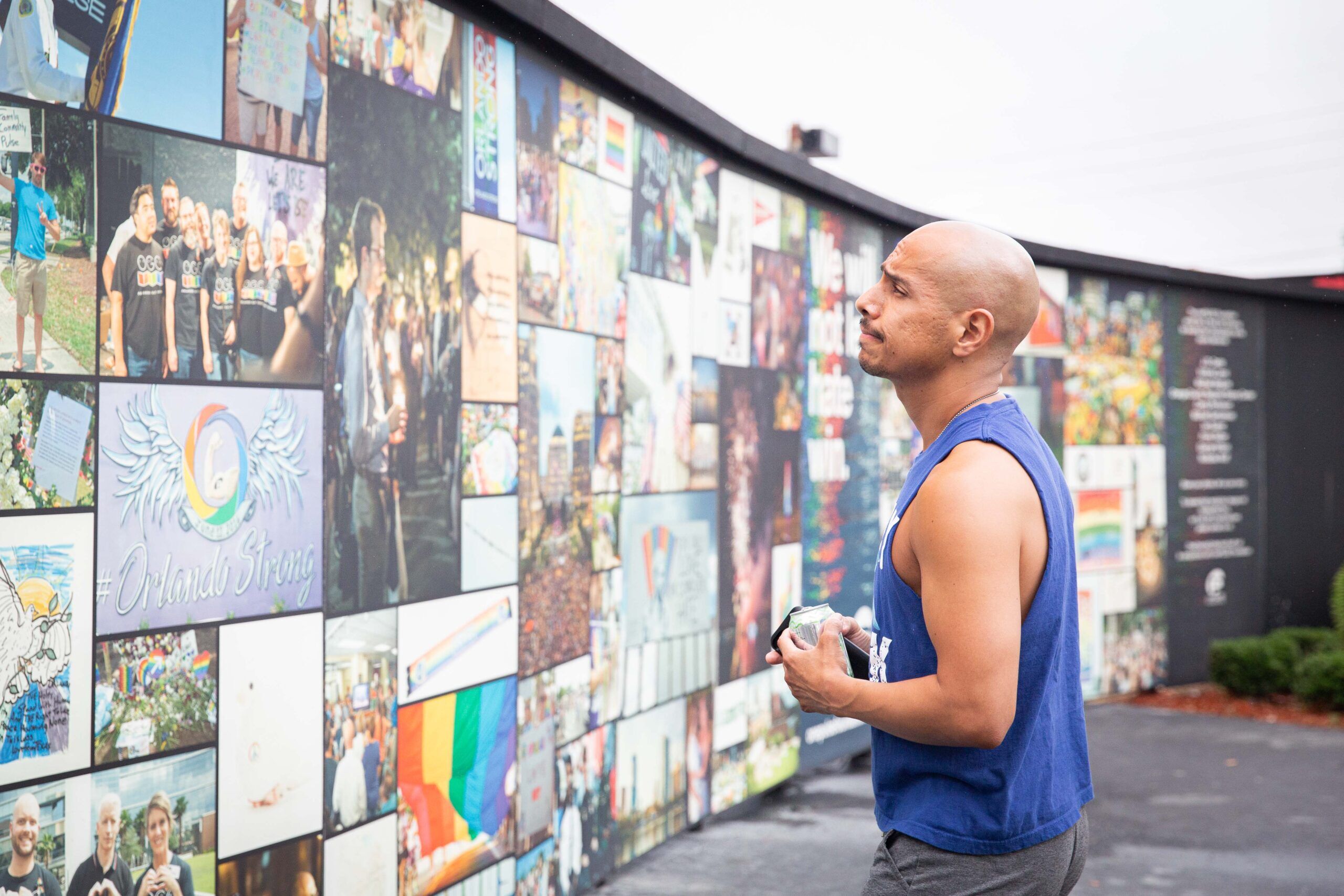This story is part of INTO’s seven-part series, in which we’ve asked queer voices to respond to the surge in gun crime and the sixth anniversary of the Pulse shooting. We hope these varied perspectives encourage dialogue and change to end the needless violence plaguing our country.
The Pulse Interim Memorial, with its vinyl-printed portraits, words of contemplation, and flower tributes that wilt and wither in the scorching Orlando sun, is a reflection of our grief and rage.
At once beautiful and unforgiving, to stand on the site of such needless devastation is to be at the center of our country’s struggle with gun culture. The events of recent weeks — no, wait — years, seem to have little impact on our collective conscience to reconsider what responsible gun ownership means.
For the past week, INTO has been exploring themes around gun violence, asking journalists and thought leaders to share their perspectives. As a solemn conclusion to this special series, we asked Orlando-based photojournalist J.D. Casto to return to a site that he has documented many times since that fateful night in 2016. It never gets easier. The profundity of visitors’ responses reminds us that underneath the political agendas, we must heal. Then we must change.
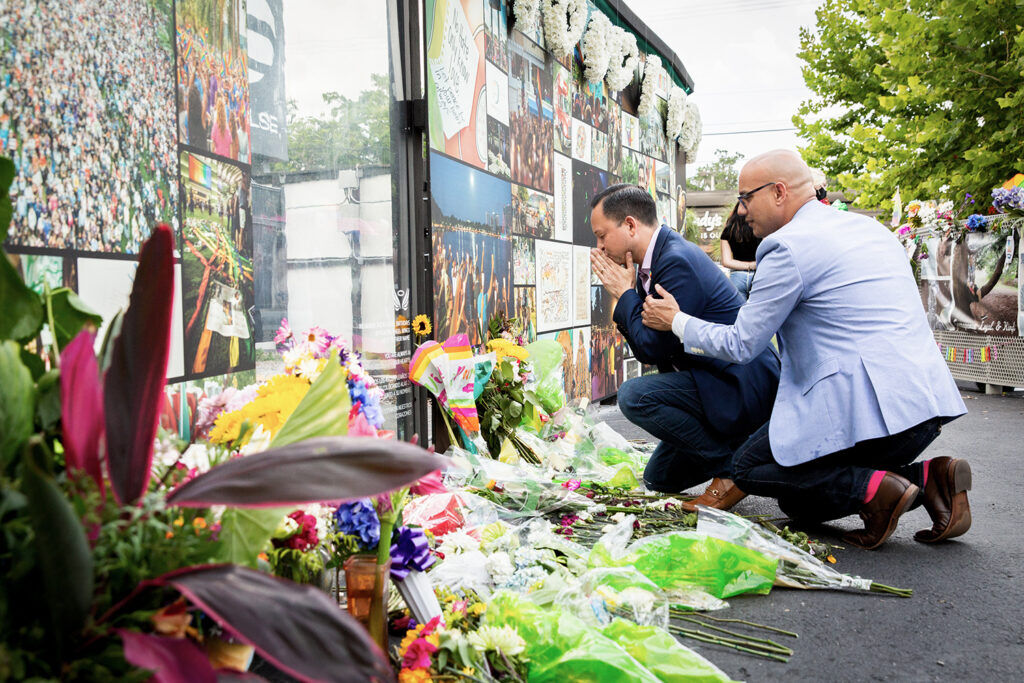
“As a queer, Latino who lives here in Orlando, we saw how gun violence can rip communities apart and shatter so many lives after the tragedy at Pulse nightclub. Forty-nine mostly LGBTQ people of color were murdered by a radical American homophobe with a military-style assault weapon. Before Pulse, I was engaged in the gun violence prevention, movement, but nothing like the involvement that we now have today. I now represent part of the Orlando area in the Florida House of Representatives and advocating for common-sense gun laws has become a part of my public service because we know what the consequences are of gun violence in our communities.
“What happened at Pulse changed my DNA.” — Florida State Representative Carlos Guillermo Smith
“What happened at Pulse changed my DNA, not just as it relates to my intolerance for bigotry and homophobia, but also in how I interact with the outside world. It’s the little things. Whenever we’re sitting at a restaurant, I’m always facing the door so that I can see who’s coming in. And what my options are. I’m looking over my shoulder. Why? Because the epidemic of mass shootings has now conditioned me to always be prepared. In the case that something were to happen. Do I have somewhere to run to? Is there somewhere I can hide? Can I keep an eye on who’s walking in the door in case I see someone suspicious? That’s just kind of how I am now.” — Carlos Guillermo Smith
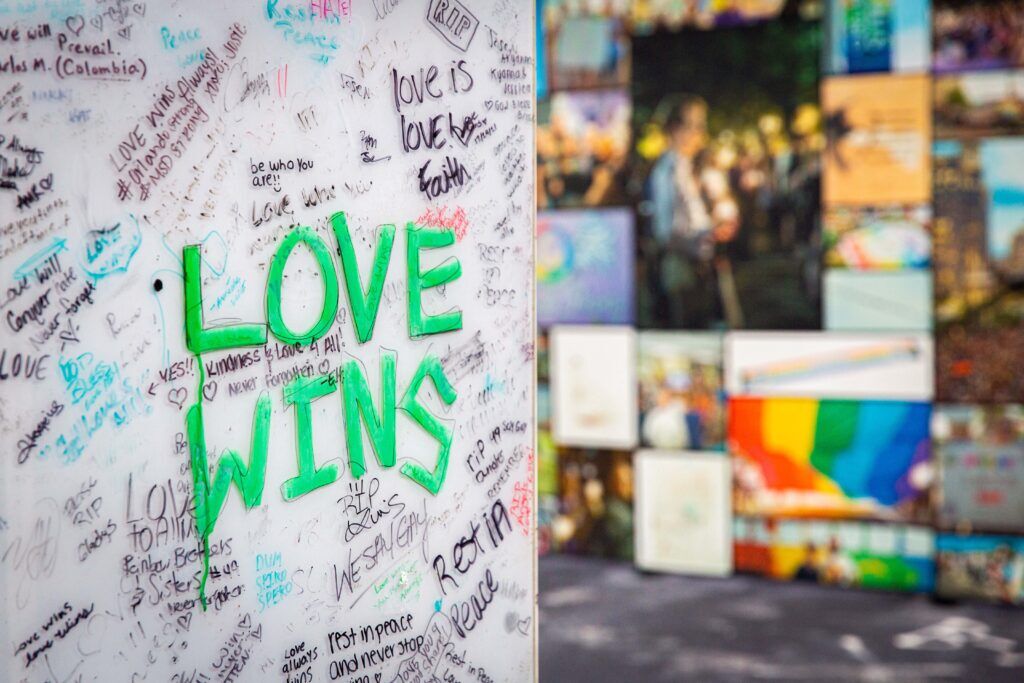
“Every time there’s a mass shooting, these conversations start to pile up again. It’s like you grow numb to it. I guess I have grown numb. But I have been affected. I’ve known people who have died of gun violence. I moved here in November 2016, five months after Pulse. Being married to Carlos and our time together has definitely brought me even closer to what the families have endured, and what it is to live with that the rest of your life.
The reason there are all of these rallies, the reason there are individuals everywhere, like Carlos, voicing out their frustration, voicing out their needs for conversations and reform — it stands on the shoulders of all those LGBTQ individuals who endured gun violence and who survived. The reason we celebrate Pride during June, it’s because of the Stonewall Riots, where people were attacked constantly. That’s why for me, the memory of this history is so necessary. And that’s why we should always repeat and repeat and repeat what happened. If we are oblivious to ignore these details, history will repeat itself.” — Jerick Media Villa
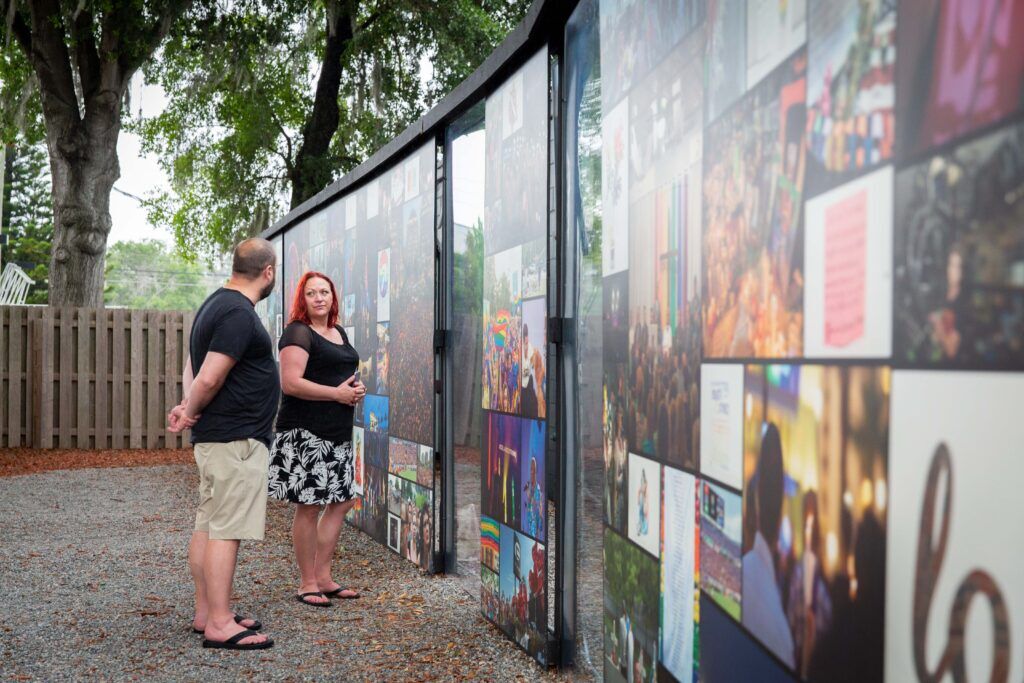
“The mass shooting affected me tremendously. Just the victims, out having a great time. Back then I didn’t know it was an LGBTQ club or anything, but then finding out that it was actually a targeted hate crime. It’s always just stuck with me. We wanted to come and honestly, just feel.” — Angie Marie
“We’re very supportive of the LGBTQ community. We’ve been touched by it personally. Our child has been on the fence about maybe being trans and we’ve tried to be very supportive. Going through that as parents, you know, it makes it real when you’re here.” — Casey Marie
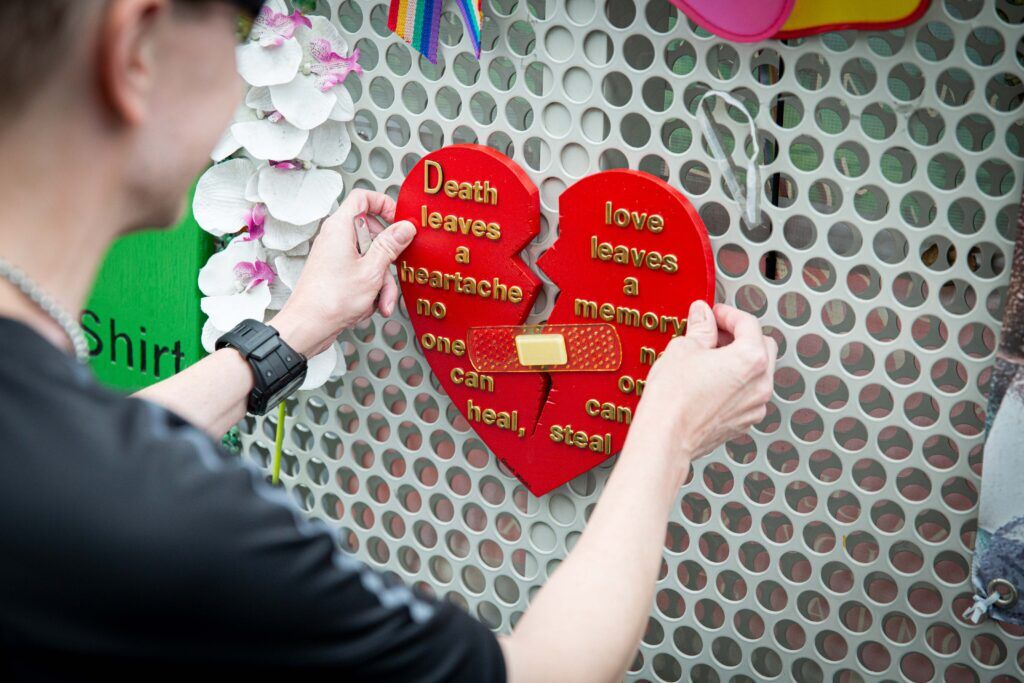
“I’m just trying to recognize the people that were lost. And show they’re not forgotten. So I found this saying and it’s appropriate. It’s a broken heart, and it says, ‘Death leaves a heartache no one can heal, love leaves a memory one one can steal.’ The Band-Aid is sort of like healing, but not healing.
“I don’t think the average citizen needs an assault rifle, that’s for military use. do people think guns are going to be taken away from them? Is that their fear? How does that impact them if they don’t have an assault rifle? What are they going to use that for in their day-to-day life? It just makes them feel powerful — is that what it is?” — Grant Wright
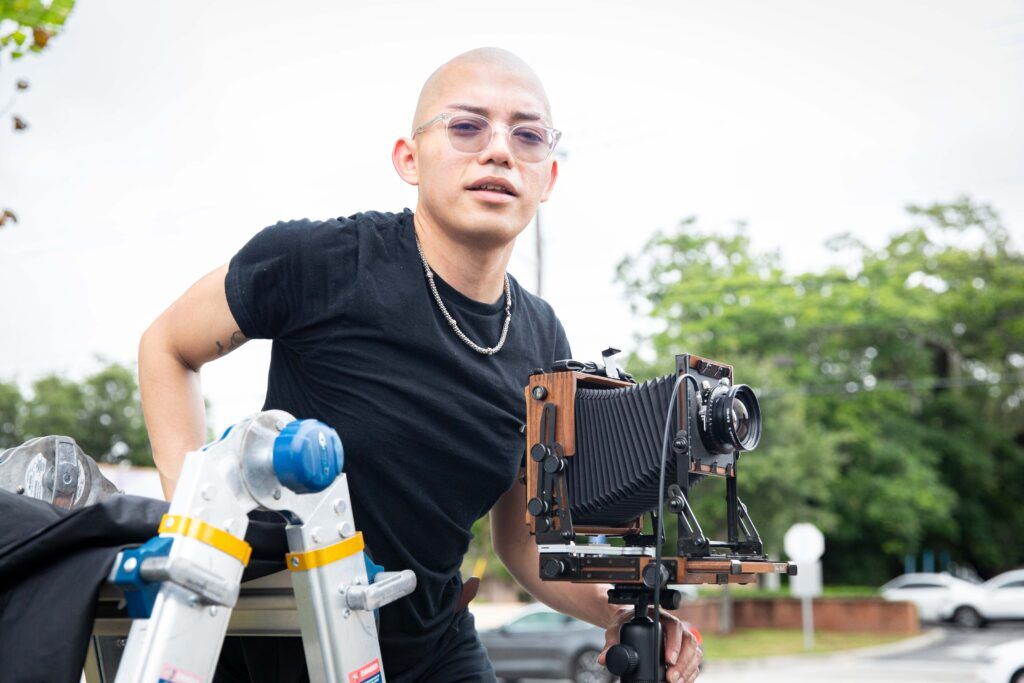
“This is my second time in Orlando, I came specifically to photograph the Pulse site. The first time that I was here in September, I photographed the outside using a 360 camera. I was interested in creating panoramic images of the site because it does occupy this kind of immersive space. And now this second time, I’m here purely to preserve and document the writing on these panels, which are quite evocative of the feelings and the emotions that are still pervasive in the city. And it makes the site feel that it’s alive and that it bears recognition.
“As a Latino immigrant, I don’t think that I’ve stopped thinking about Pulse since it happened in 2016. When it happened, I remember talking to a friend and I said, ‘You know, that could have been any of us.’ Since then, I have become more and more aggravated by the lack of gun reform in this country. This is now speaking in light of the recent shooting of children in Uvalde. This is now the third mass shooting that has specifically been targeted at Brown and Latino communities, of all stripes, of all sexualities, of all classes. It’s a very tough question when you ask whether I’ve been personally impacted because I could say No. But in a lot of ways Yes. All three of those shootings have wounded me and affected me, and left a lot of emotional scars.” — Jonathan Molina-Garcia
Don't forget to share:
Help make sure LGBTQ+ stories are being told...
We can't rely on mainstream media to tell our stories. That's why we don't lock our articles behind a paywall. Will you support our mission with a contribution today?
Cancel anytime · Proudly LGBTQ+ owned and operated
Read More in Culture
The Latest on INTO
Subscribe to get a twice-weekly dose of queer news, updates, and insights from the INTO team.
in Your Inbox

